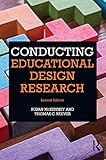Conducting Educational Design Research / by Susan McKenney and Thomas C Reeves.
Material type: TextLanguage: English Publisher: Boca Raton, FL : Routledge, [2018]Copyright date: ©2019Edition: Second editionDescription: 1 online resource (326 pages) : 51 illustrations, text file, PDFContent type: text Media type: computer Carrier type: online resourceISBN: 9781315105642Subject(s): Instructional systems -- Design -- Research | Educational Design Research | Educational Research | Higher Education | Research Methods in Education | Susan McKenney | Thomas ReevesGenre/Form: Electronic books.Additional physical formats: Print version: : No titleDDC classification: 371.1007 LOC classification: LB1028.38Online resources: Click here to view. Also available in print format.
TextLanguage: English Publisher: Boca Raton, FL : Routledge, [2018]Copyright date: ©2019Edition: Second editionDescription: 1 online resource (326 pages) : 51 illustrations, text file, PDFContent type: text Media type: computer Carrier type: online resourceISBN: 9781315105642Subject(s): Instructional systems -- Design -- Research | Educational Design Research | Educational Research | Higher Education | Research Methods in Education | Susan McKenney | Thomas ReevesGenre/Form: Electronic books.Additional physical formats: Print version: : No titleDDC classification: 371.1007 LOC classification: LB1028.38Online resources: Click here to view. Also available in print format.Includes bibliographical references and index.
Part I: Foundations -- 1: About educational design research -- 2: Contributions to theory and practice: Concepts and examples -- 3: Toward a generic model for educational design research -- -- Part II: Core processes -- -- 4: Analysis and exploration -- 5: Design and construction -- 6: Evaluation and reflection -- 7: Implementation and spread -- -- Part III: Moving forward -- -- 8: Getting started: Writing proposals & preparing for launch -- 9: Reporting educational design research -- 10: Looking back and looking ahead -- -- Appendix: Related reading.
Educational design research blends scientific investigation with the systematic development and implementation of solutions to educational challenges. Empirical inquiry is conducted in real learning settings – not laboratories – to craft effective solutions to the complex challenges facing educational practitioners. At the same time, the research is carefully structured to produce theoretical understanding that can serve the work of others.Conducting Educational Design Research, 2nd Edition has been written to support graduate students as well as experienced researchers who are new to this approach. Part I describes the origins, outcomes, and generic approach. Part II discusses the core processes of the generic approach in detail. Part III recommends how to propose, report, and advance educational design research. In addition to expanded treatment of research goals and practicalities, more examples, and attention to design-based implementation research, this new edition features enhanced guidance. For each of the four core processes, this volume offers: assessment tools detailed, behind-the-scenes descriptions of actual project work examples of how specific theories have been used to enrich the work For decades, policies for educational research worldwide have swung back and forth between demanding rigor above all other concerns, and increasing emphasis on impact. These two qualities, rigor and impact, need not be mutually exclusive. This volume supports readers in grasping and realizing the potential of educational design research. It demonstrates how rigorous and relevant investigation can yield both theoretical understanding and solutions to urgent educational challenges.
Also available in print format.
